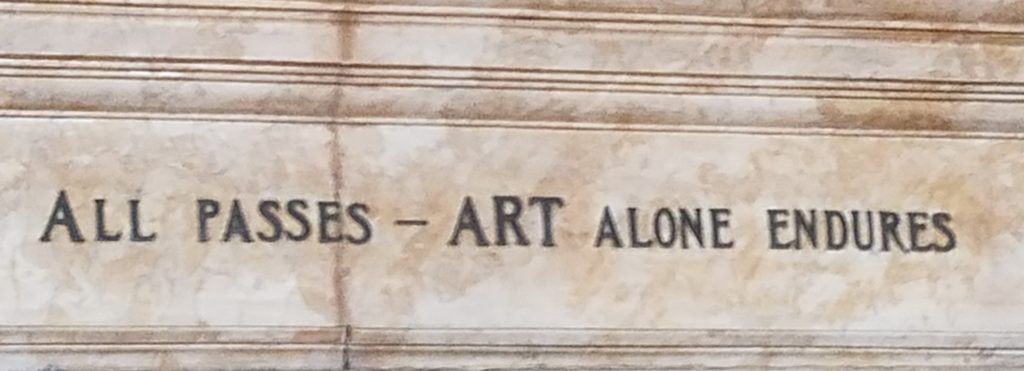“I trust in nature for the stable laws of beauty and utility. Spring shall plant and autumn garner to the end of time.” Robert Browning
This first Thursday of September marks the FIFTH anniversary of my Blog here at ChoralNet, Choral Potpourri. I’ve written over 250 Blogs, more or less, including repeats during the summer and requests for a favorite blog or two. I take my blogging duty seriously. Many of you contact me with your queries and dilemmas for advice about important things, as well as some not so important things. Many ask if they are “right” or what they are feeling is “right” or sometimes just want to know if they’re on the “right” track. Most just want to be reassured and I try to make you feel good about your choices.
I chose the name “Choral Potpourri” for my blog because I planned to write about many things choral related in addition to what I call “Choral Ethics”, and I have. Often, I write about subjects of concern to those who contact me or seasonal thoughts or an issue in our profession or in the news which affects us. But at the heart of this Blog is Choral Ethics.
For the month of September, I will be reviewing what Choral Ethics is and how it came to be. With this most unusual year and the beginning of our academic and concert seasons, perhaps it would be good to contemplate as we navigate our very different circumstances.
A little over five years ago, I began to write about something I called “Choral Ethics.” A few things motivated me, including a rather unpleasant encounter at a community arts event with a choral colleague. Nothing seemed to provoke our confrontation; in fact, I had just recommended the person for a rather nice job. But she was hell-bent on being unpleasant, so…unpleasant she was. She harangued me in public and I thought she was being “unprofessional” as well as something else I couldn’t define. After our encounter, I began thinking about behavior, specifically what we deem “professional” behavior.
“Professional” means different things to different people and musicians throw the term around all the time. It may mean being on time for rehearsals and gigs, being cooperative and even collegial. It may also mean practicing and being prepared—having the right music or a pencil handy–for rehearsal. We can agree being a “professional” may mean being on time or bringing a pencil, but it is something much more. “Professional” may also be used to describe a conductor’s behavior.
As I began to think of what I believed a lack of professionalism, it occurred to me it is not a lack of professionalism but a lack of some sort of accepted ethical guidelines of behavior within our profession. There are things we should not be doing, of course, and we all think we know what they are. But do we?
There are plenty of people, both musicians and “civilians,” who give conductors and singers a pass for bad behavior simply because they are so high strung and talented and artistic and so concerned with perfection and so…..well, you fill in the blank. They reason, since the Maestro/Maestra is so talented, they must be justified in behaving like a four-year-old and the rest of us must not be as talented because we don’t. Somewhere along the line, it’s become acceptable and even preferable within our profession to be prickly in the name of music. When we accept this behavior in others, we can be sure to be treated to another round of something new and even more outrageous from them the next time.
Physicians take an oath—the Hippocratic Oath–as they graduate from medical school and are awarded their M.D.s. They swear to “do no harm.” I wonder if we should be required to do the same. We must do no harm to our singers, both physically and emotionally, by using our knowledge of the human voice to prevent injury and by not emotionally abusing them by our behavior inside rehearsals and out. We must do no harm to our colleagues by not bad mouthing or undermining them in public to singers or audience members or the community at large. We must do no harm to our profession as a whole by upholding ourselves to as high a musical standard as possible within our scope of expertise and by respecting the rights of the composers we perform. As well, many believe it important to choose repertoire not in conflict with their own belief system, whether because of a composer’s behavior or a composition’s message.
Each of us needs to think about our own personal code of choral ethics, ideally beginning to develop our code while in training. Those working with young conductors can begin the process by being a good example first and sharing their personal codes with students. I find my own teachers and the conductors I have worked with influencing my own ethical code, whether positively or negatively.
Next week, I’ll share some thoughts about my own personal code of Choral Ethics. Until then, be well and be safe.
I am taking my Choral Ethics Blogs to my chamber choir’s Facebook page for the foreseeable future. Please join me there this morning!



Leave a Reply
You must be logged in to post a comment.